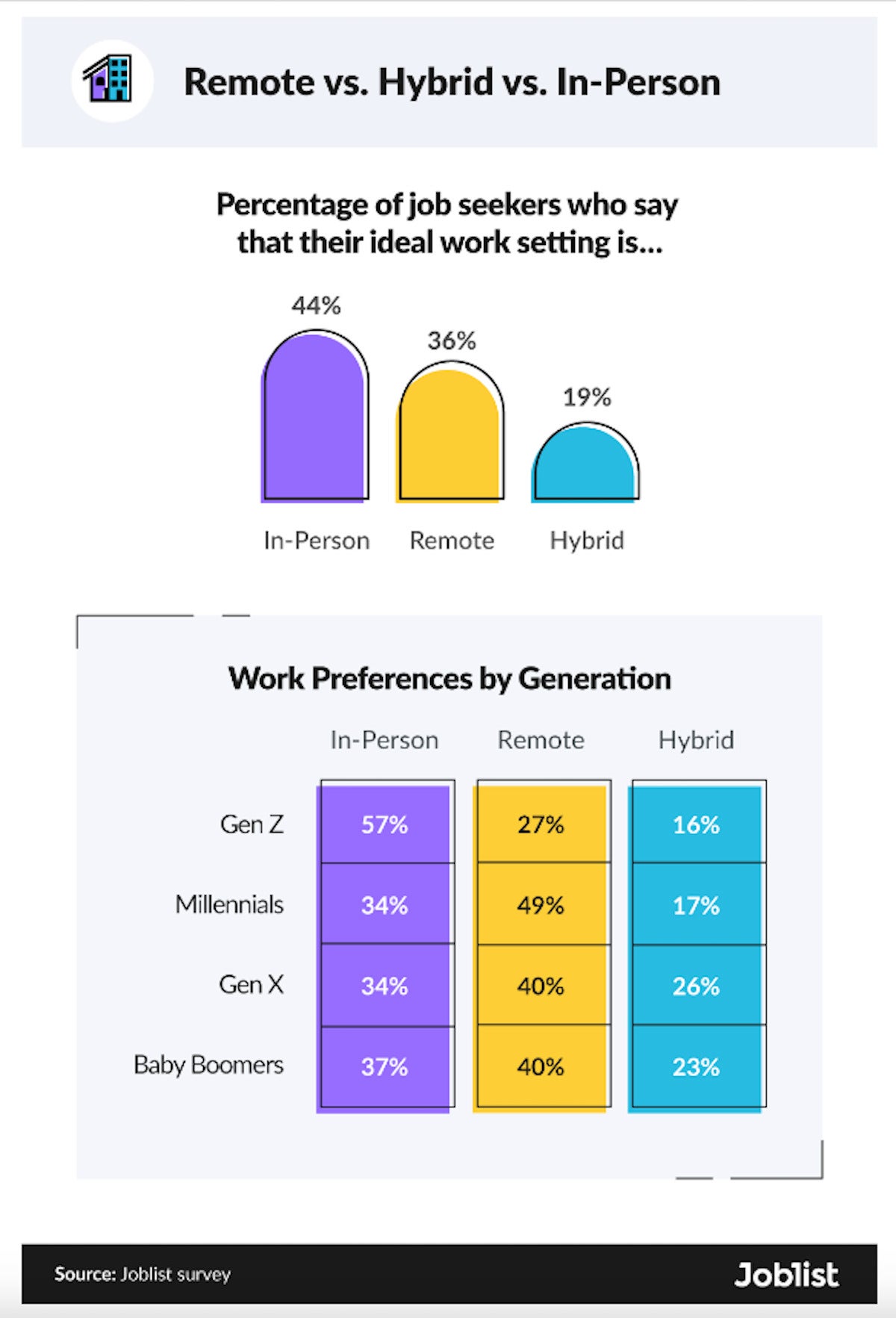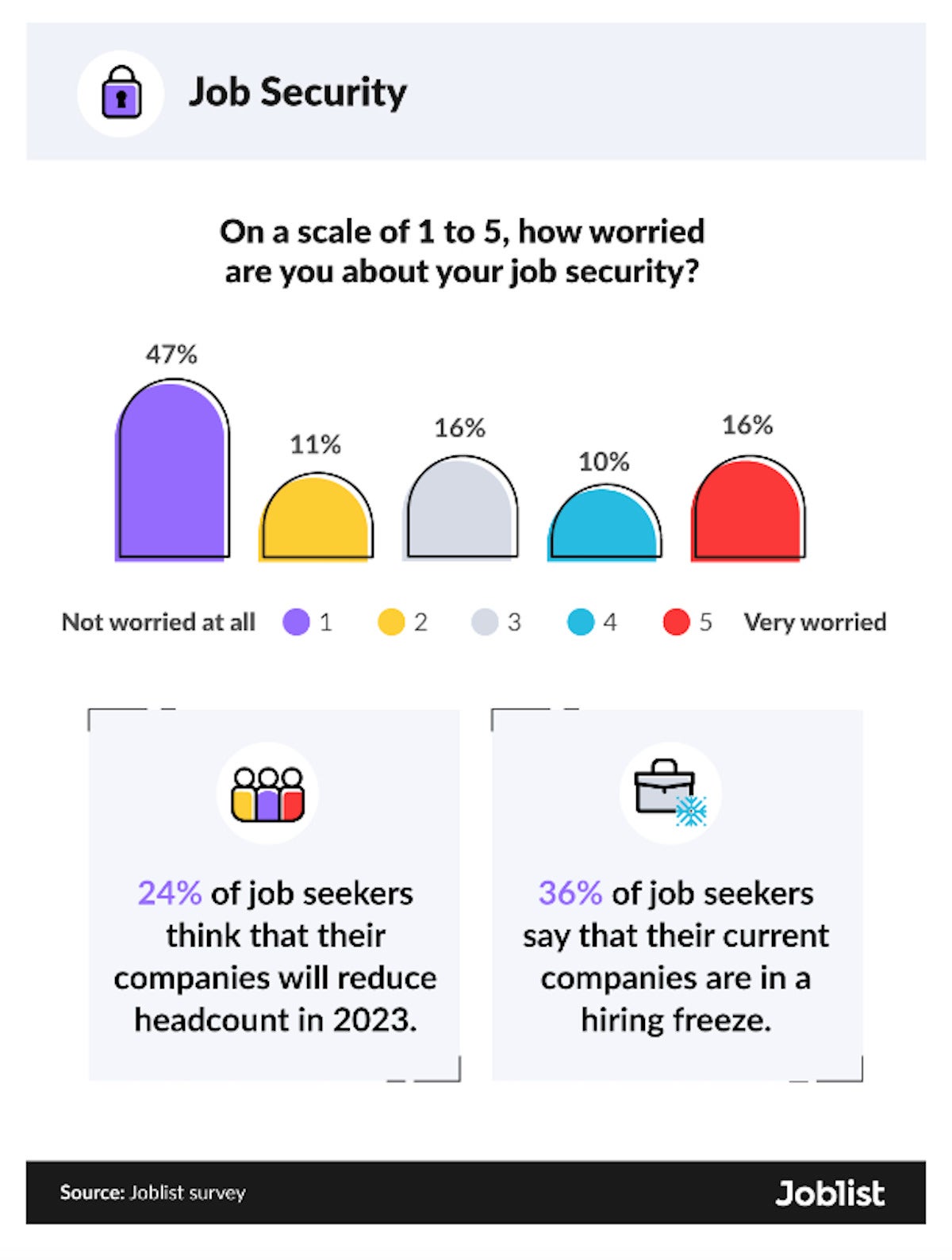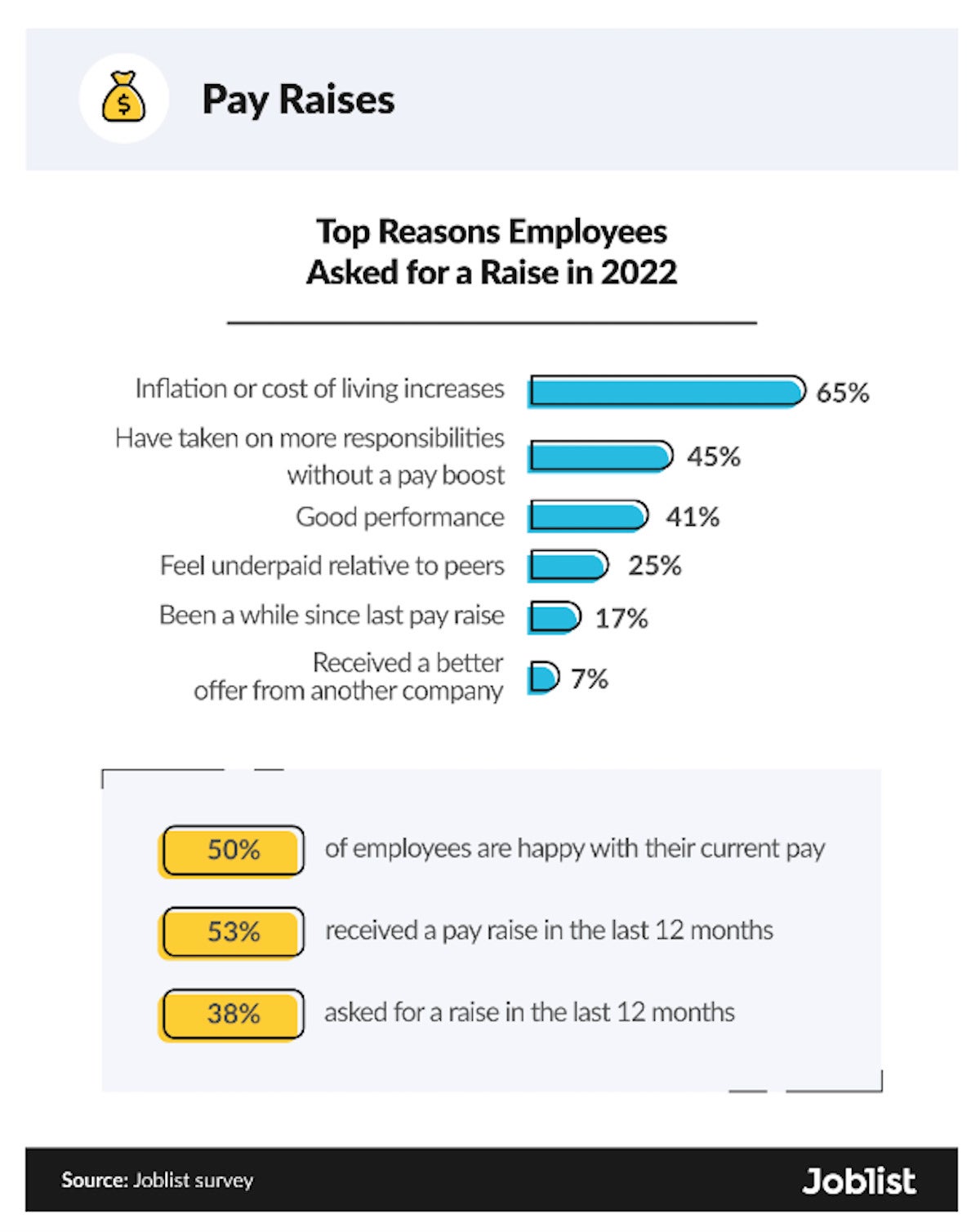Older employees want to work fully remote nearly twice as much as younger ones, according to a new study by job search site Joblist.
The study found that about half (49%) of millennials surveyed want to work fully remote, whereas only 27% of Generation Z (Gen Zers) feel the same way; they're much more likely than average “to be seeking in-person” work opportunities. Oddly, Gen X and baby boomers felt less impassioned about remote options. Only 40% of either group indicated “their ideal workplace setting” should be remote.
 Joblist
JoblistOverall, 36% of job seekers are looking for fully remote roles this year; 44% want an in-person position, and 19% prefer a hybrid option. The online employment site’s data was derived from surveying more than 30,000 job seekers from across the US over the past three months.
Of job seekers already working remotely at least some of the time, 43% indicated they would quit if they had to start working in person full-time in 2023.
(Baby boomers are considered those born between 1946 and 1964. Gen X are those born from mid-to-late 1960s to the late 1970s. A Millennial is anyone born between 1980 and 1995. And Gen Zers are those born between 1996 and the early-to-mid 2000s).
“The generational differences are striking, and also understandable. At their mid-career stage, Millennials likely have more financial responsibilities than Gen Zers and less job security and stability than older generations,” Joblist said about the results. “In addition, Millennials may have some specific scar tissue from entering the job market during or after the 2008 financial crisis, leading to more skepticism and concern in the current environment.”
More important than a simply offering remote, hybrid, or onsite work options is ensuring employees have flexibility around their schedules, according to Jamie Kohn, a Gartner research director.
“In our data, we see that flexibility in working hours is more important to people than flexibility in where people work. People are really looking to shape their jobs around their lives. If you can offer that, even if you have onsite work, you’re probably going to keep a lot of people,” Kohn said.
For example, baby boomers and Millennials are more likely to have older parents who may require care, and younger employees will have small children.
“People are less committed to jobs they have because changing jobs doesn’t carry as high a cost as it used to,” Kohn said. “It’s swapping one laptop out for another.”
Overall, the current job market remains extremely strong for most job seekers, especially for technology workers. However, Joblist’s survey results indicated that there are growing concerns about a potential recession and worsening job prospects this year, particularly among Millennials.
 Joblist
JoblistThe Great Resignation continues
In the survey, one-quarter indicated they had quit a job in 2022. The most prominent reason for quitting — given by 39% of those who did — was bad management or a toxic workplace. Another 26% cited insufficient pay, limited growth opportunities (17%), burnout (17%), lack of schedule flexibility (12%), or inadequate benefits (9%). And 35% quit their job without having a new position lined up.
Kohn said burnout is one reason workers are exploring other opportunities. “They feel unappreciated at work and feel they’re not paid enough at their jobs,” she said.
The Great Resignation, which saw more than four million US employees quit their job every month of 2022, is expected to evolve this year, according to Amy Loomis, vice president for IDC's worldwide Future of Work market research service.
“The tech sector is shedding excess jobs but at the same time desperate for skilled IT workers who can offer support for security, ITSM [IT service management], programming and other technical requirements,” Loomis said. “Look at where the layoffs are happening — it’s not just layoffs per se, but targeted layoffs in HR for example. There is a lot of reshuffling going on and companies are competing for the talent by offering remote and hybrid work arrangements.”
 Joblist
JoblistWhile employee churn will continue, Loomis believes companies will settle into more standardized flexible work arrangements that create greater stability.
That said, the majority of job seekers (52%) feel they — not employers — have the upper hand in the current job market. In fact, 78% of job seekers believe that they can make more money by switching jobs rather than staying put, according to Joblist’s survey.
“We expect turnover to remain higher for at least the foreseable future,” Kohn said. “The big reason for this is the expansion of remote work. People have more job opportunities than they had before because they’re not restricted by where they live. Also, people are less committed to jobs they have because changing jobs doesn’t carry as high a cost as it used to. It’s swapping one laptop out for another.”
Employers still need to address burnout. Half of workers in the survey said they're already burned out and pessimistic about their company's ability to deal with the problem. In fact, 62% of workers feel their employer is not doing enough, 52% believe their employer does not care about their well-being and 73% see no significant growth opportunities. Job seekers working in person reported lower rates of burnout than those working remotely (48% compared to 55%).
Pay is not keeping up with inflation
As 2023 begins, only 50% of job seekers report being happy with their current pay, while even fewer (45%) say that they feel financially comfortable. Although 53% of workers received a raise in 2022, those raises tended to be small, according to Joblist.
 Joblist
JoblistIn total, 89% of raises were less than 10%, and 65% were less than 5%. Of those workers who asked for a raise, only 59% got one; the top reason for seeking a raise was inflation and cost-of-living increases.
“I think companies are reluctant to take on a permanently higher expense. We’re seeing companies turn more toward bonuses than pay raises becase the competition in the labor market is really driving wages up but they don’t think that will stick,” Kohn said. “So, you don’t want to hire a bunch of people who you have to pay higher wages to or adjust current employee wages to match.”

